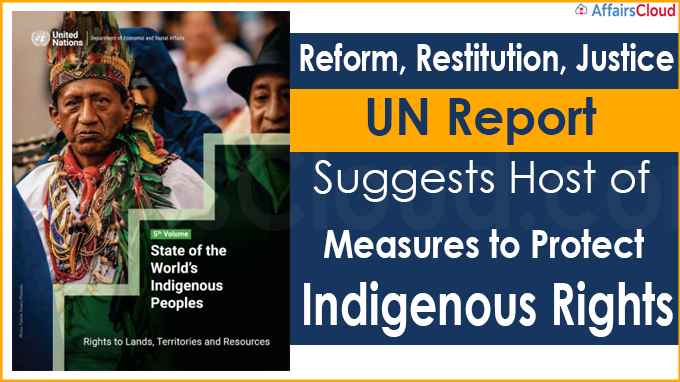 On 15th and 16th March 2021, the United Nations(UN) Department of Economic and Social Affairs(DESA) released the State of the World’s Indigenous Peoples (SOWIP) volume V entitled “Rights to Lands, Territories and Resources”. The report examines challenges faced by the indigenous people in asserting their rights to lands, in the context of agribusiness, extractive industries, development, conservation and tourism.
On 15th and 16th March 2021, the United Nations(UN) Department of Economic and Social Affairs(DESA) released the State of the World’s Indigenous Peoples (SOWIP) volume V entitled “Rights to Lands, Territories and Resources”. The report examines challenges faced by the indigenous people in asserting their rights to lands, in the context of agribusiness, extractive industries, development, conservation and tourism.
- The preparation of the report was overseen by the Secretariat of the Permanent Forum on Indigenous Issues.
SOWPI V: Rights to Lands, Territories and Resources:
i.The report offers a wide range of perspective on the rights of indigenous peoples on lands, territories and resources through analysis of legislation and agreements at the national and international level and through customary law.
ii.The report analyses the successful practice and obstacles to realise the indigenous people rights to land and territories and suggest ways for their development.
Importance of protecting the land and territory rights of Indigenous people:
i.The Indigenous people face challenges to get recognition of their rights to land and endure the land grabbing, dispossession and displacement.
ii.The territories of the indigenous people hold the world’s most non commercially exploited land, minerals and forest resources, rivers, fossil fuels and other renewable energies.
iii.The protection of their rights to land and territory is significant for the whole planet.
SDG on indigenous people’s rights to land:
The 2030 Agenda for Sustainable Development adopted by the UN provides an opportunity to promote the rights of indigenous people to land, territory and resources due to its integrated approach to economic, environment and social development within a human rights framework.
The SDG 15: Life on Land focuses to Protect, restore and promote sustainable use of terrestrial ecosystems, sustainably manage forests, combat desertification, and halt and reverse land degradation and halt biodiversity loss.
Recent Related News:
According to the ‘International Migration 2020-Highlights’ report released by the United Nations Department of Economic and Social Affairs (UN DESA), In 2020, 18 Million persons from India were living outside of their country of birth thus making it the World’s Largest Transnational Community. India is followed by Mexico & Russia (11 Million each), China (10 Million) & the Syrian Arab Republic (8 Million).
About UN-DESA:
Under-Secretary-General for Economic and Social Affairs– Liu Zhenmin
Headquarters– New York, United States




